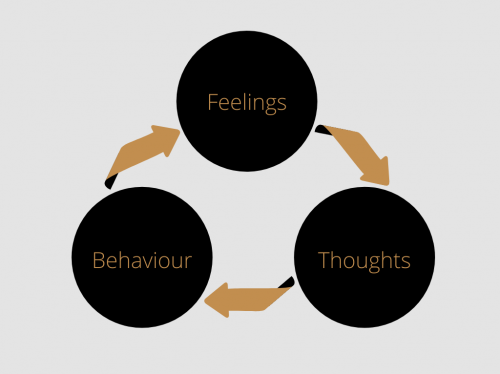What is CBH?
Cognitive behavioural therapy (CBT) is an integrative therapy focusing on current problems rather than past traumas or events. While patterns of behaviour and thinking may have developed over time cognitive behavioural therapies focus on practical solutions to dealing with present experiences - you cannot undo the past, but you can change the way you respond in the present moment, now, to the past, present and future. Fundamental to CBT and CBH is the understanding that the way we respond to events is not due to the event itself but the way in which we interpret that event in the present moment, based on our beliefs and assumptions learnt and developed across our lifetime. This often results in a complex mix of feelings, thoughts and behaviours, which over time can reinforce our core beliefs, occasionally in unhelpful ways.
CBH addresses feelings (emotions), thoughts (cognitions) and behaviours individually and together. Sometimes simply being aware and able to conceptualise these relationships changes things remarkably. Compared with other approaches, the CBH model I use is an integration of social, cognitive and behavioural psychology and psychotherapy with a modern approach to hypnosis. This allows me to be skilful and flexible in the way I integrate hypnosis with other approaches. The integration of hypnosis with CBT utilises the way we can use our imagination to challenge negative thoughts and feelings and to deliberately replace them with more positive suggestions, and to enable us to achieve complete relaxation quickly and effectively. CBH integrates hypnosis fully with CBT, drawing on the way we can use our focused attention and imagination to challenge negative thoughts and feelings and to deliberately replace them with more positive suggestions, as well as enabling us to achieve complete relaxation quickly and effectively.
"Men are disturbed not by things, but by the views which they take of them"
Epictetus.
People's emotions and behaviours are influenced by their perception of events. Often negative self-hypnosis, mediating beliefs that produce unhelpful coping behaviours, leads to a kind of hypnotism or autosuggestion that you're already doing automatically, without realising it. Only this involves unhelpful thoughts rather than helpful ones of the kind we might explore later in therapy.

What is Hypnosis?
Hypnosis is focused attention on a dominant idea, whilst expecting that something will happen and accepting and responding to suggestions. A dominant idea will most often be relaxation, for example. Hypnosis is not something I, as the therapist, do to you. It is something you willingly do yourself: you are in control, at all times. In this way all hypnosis is self-hypnosis. The experience of deep relaxation in hypnosis can be profound and life-changing. Hypnosis does not involve entering into some sort of magical or mysterious 'trance'. Hypnosis is a normal waking process.
You may have experienced this already yourself, for example, negatively when you are so focused on worrying about something that you may be completely unaware of what is going on around you, or simply when day-dreaming. I can help you use self-hypnosis to relax deeply, to calm the body and the mind entirely, and to challenge and replace negative thoughts, feelings and behaviours with positive ones, changing your entire mindset. Using your imagination in hypnosis you can rehearse and challenge your responses to anxiety-provoking situations, freeing yourself from fears and worries. Hypnosis is fully supported by peer-reviewed, evidence-based scientific research, on its own and integrated with CBT, which is the model of psychotherapy recommended by NICE and the NHS. All the techniques I use are tried and tested.
Key ways in which hypnosis enhances cognitive and behavioural interventions include:
- Raising ‘response expectancy’ (the expectation that something will occur in response to cues)
- Facilitating relaxation
- Improving the client’s degree of ‘imaginal absorption’
Among numerous others!
What is involved in CBH?
I believe initial contact by phone or email, to discover if my approach would be suitable for you is the best first step. Our first session will be an assessment and conceptualisation of your issue. This is particularly important as it offers an initial exploratory session for us both, to understand how CBH will be suitable for you and helping to navigate a first approach to your initial treatment plan. Many people find that the first session is therapeutic in itself, as we begin to unpack some of the issues and the relationship between feelings, thoughts and behaviours. Many people find that the first session is therapeutic in itself, as we begin to unpack some of the issues and the relationship between feelings, thoughts and behaviours.
CBH is typically a short term treatment programme, often around 4-8 sessions, though it could be more or fewer depending on the nature of presenting issues. I always review the treatment plan after a few sessions, to agree how many more sessions, if any, may be needed. Subsequent sessions will depend on the issues, and will be tailored to your specific needs, drawing on evidence-based treatments and integrated from cognitive behavioural therapy, hypnosis, mindfulness, compassion, Acceptance and Commitment Therapy (ACT), and a wide range of resilience skills, including, for example, deep relaxation and stress management, assertiveness and problem solving skills.
CBT focuses on an individual’s capacity to change themselves, altering how you think, feel and behave. Treatment does not address outside problems or families which can impact on a person’s health and wellbeing. Therefore to benefit from cognitive behavioural therapy, it’s essential that you commit to the process. I can advise and treat you with your full co-operation. This is one reason why CBH treatment is typically short-term - it is a highly proactive therapy; it involves you practising some of the techniques and tools, that we will go through together, between sessions. The more you practice the techniques the more quickly progress can be observed.
All treatment is strictly confidential (subject only to ethical considerations with respect to risk of harm to self or others, as required by my professional practice bodies). I am a registered practitioner with the General Hypnotherapy Register (GHR) and the Complementary and Natural Healthcare Council (CNHC) and abide by their Codes of Ethics (copies available via the links above). I am also fully compliant with the General Data Protection Regulation 2018 and provide a copy of my Privacy Notice with respect to confidentiality, security and personal data at the start of any treatment.
Prices
- 20 minute Telephone consultation FREE
- Block of 4 sessions £300
(Initial assessment 1.5 hours, subsequent sessions 1 hour each)
I accept bank transfer (BACS) payments and cash.
Please provide 48 hours notice for cancellation to avoid otherwise being charged for the session.
Get in touch
Feel free to contact me if you have any questions about how CBH works, or to arrange an initial assessment appointment. This enables us to discuss the reasons you are thinking of coming to therapy, whether it could be helpful for you and whether I am the right therapist to help. You can also call me on 07794964364 if you would prefer to leave a message or speak to me first.
I offer sessions online using Zoom. I predominantly see clients from London and Brighton, as well as across the UK and worldwide. Contact me to find out more about how online therapy works. I hope to provide face-to-face therapy in the future.
©2022 Unity Wellbeing Therapy
powered by WebHealer
